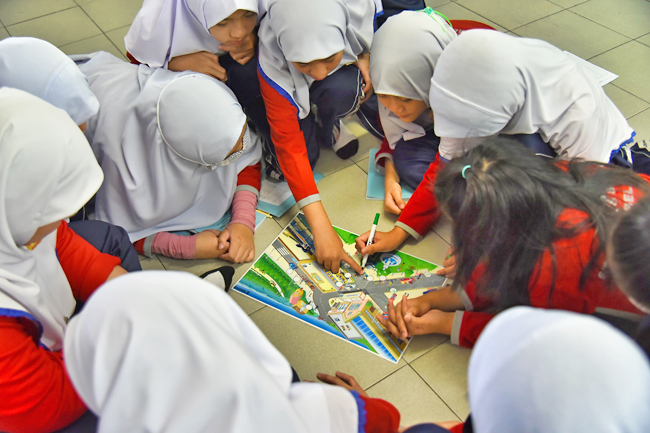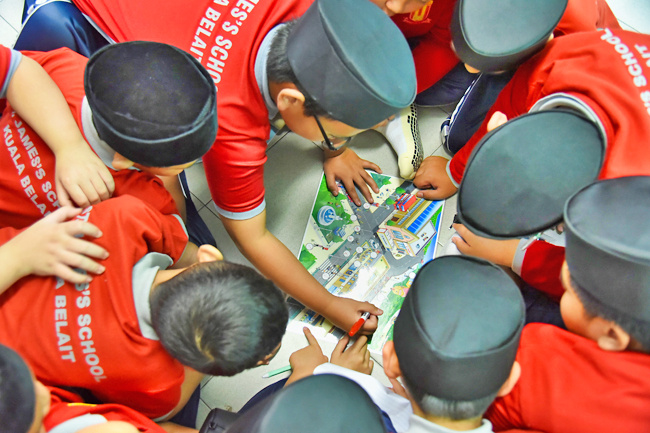Road safety is more than a checklist of traffic rules – it is a collective duty shared by everyone setting foot on the road, whether behind the wheel, on two wheels or on foot.
Each year, lives are tragically lost or altered due to accidents that, in many cases, could have been avoided with simple yet mindful actions.
But responsibility doesn’t rest solely with drivers; pedestrians, cyclists, and passengers all have a part to play in making streets and highways safer for everyone.
Creating a culture of road safety begins long before one grips a steering wheel – it starts with awareness, education, and a commitment to responsibility from an early age.
In a bid to nurture this mind-set, St James School recently partnered with Megamas Training Company in an interactive engagement programme that brought road safety to life, equipping young minds with essential knowledge that could one day save lives.
Clear and straightforward practices – such as sticking to speed limits, obeying traffic signals, and staying alert to road conditions – may seem basic, yet they are powerful safeguards against accidents, particularly when it comes to protecting children.
Megamas’ Transportation Training Manager Shuwarde bin Haji Ismail, who led several road safety briefings as part of the programme, shed light on key discussions aimed at instilling responsible habits among young learners.


“Speeding, for instance, is one of the leading causes of road accidents worldwide. A driver exceeding the speed limit by just a few miles per hour has reduced reaction time, increasing the likelihood of collisions.
“Similarly, distractions such as using mobile phones while driving or crossing streets carelessly can lead to fatal accidents,” he explained.
He also emphasised the vital role pedestrians play in road safety.
“Using designated crossings, obeying traffic signals, and ensuring visibility – especially at night – are essential precautions. Many pedestrian-related accidents happen due to jaywalking or failing to check for oncoming traffic. Just as drivers must stay alert, pedestrians must also exercise caution to prevent potential dangers.”
As part of the programme, he also covered key topics for the children, including the importance of wearing seatbelts and recognising common road signs and their meanings.
Through interactive games and engaging activities, students absorbed crucial road safety knowledge in a fun and memorable way, helping them develop habits that could one day save lives.
“We also observed, earlier in the morning, when students arrived at school with their parents and guardians to see whether or not they were wearing their seatbelts. This helps to establish a connection between the topics covered in the presentation and their everyday lives.”
He also emphasised that engaging young, observant students from Year 4 to 11 is one of the most effective ways to nurture a road safety-conscious society.
With their natural curiosity and ability to absorb new information quickly, children are at the ideal stage to develop responsible road habits. By learning about traffic rules, the importance of pedestrian crossings, and the dangers of reckless behaviour early on, they are more likely to carry these lessons into adulthood, shaping a generation that prioritises safety on the road.
Haji Abdul Hakim Al-Alim bin Haji Janaji, a teacher from the school’s Bahasa Melayu Department who helped lead the programme, highlighted how interactive sessions like these serve as valuable tools in instilling road safety awareness.
By making learning engaging and hands-on, such initiatives reinforce responsible behaviour in a way that stays with children long after the sessions end.
“This road safety programme aims to highlight the potential dangers found on the road, and that certain simple steps can be taken which can drastically reduce said risk,” he added.
In addition to being aware of the dangers, these programmes and initiatives also encourage children to become advocates for road awareness within their families and communities.
As children continue to develop an awareness of road safety at an early age, it can influence their peers and even adults around them. “Upon learning about these simple tips and tricks of staying safe on the road, such as obeying speed limits, wearing seatbelts, and refraining from using mobile phones while driving; a child may become an advocate of safety in reminding a parent to wear a seatbelt or wait for the pedestrian signal to turn green before crossing.”
By instilling road safety awareness at an early age, it can help positively influence the driving habits of the adults around them. In addition, these young children will grow up to be future leaders with a safety-first mind-set, reducing accidents and fatalities in the long run.
Ultimately, road safety is not a passive responsibility – it is an active commitment that requires everyone to be mindful and disciplined.
Whether as a driver or a pedestrian, each person has a role to play in making our roads safer, and through continuous education and awareness through initiatives and programmes such as the one held at the aforementioned school, it can collectively reduce road accidents and protect lives.
Instilling a road safety first mind-set among young minds and reinforcing positive habits, can help pave the way for a future where road safety is ingrained in society’s core values – saving lives, one responsible action at a time. – Daniel Lim





